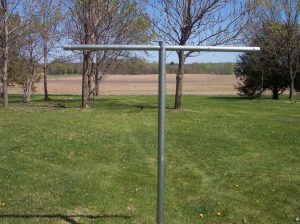 Many short short stories — so-called “flash fiction” or “sudden fiction” stories — seem to operate in the manner of poetry, powered by their associative qualities. A particular image or series of images deepens in meaning, growing increasingly nuanced and complex. That’s what George Saunders does with the crossed metal pole in the story “Sticks,” barely more than a page in length. At first, the pole seems to simply serve, as the story suggests, as the father’s “one concession to glee,” a place where he commemorates holidays and other special occasions. But when Saunders promptly juxtaposes this image with the father’s absurdly controlling behavior and Spartan rules — “he hovered over us as we poured ketchup, saying, Good enough good enough good enough” — the meaning of the cross becomes broader, more sinister.
Many short short stories — so-called “flash fiction” or “sudden fiction” stories — seem to operate in the manner of poetry, powered by their associative qualities. A particular image or series of images deepens in meaning, growing increasingly nuanced and complex. That’s what George Saunders does with the crossed metal pole in the story “Sticks,” barely more than a page in length. At first, the pole seems to simply serve, as the story suggests, as the father’s “one concession to glee,” a place where he commemorates holidays and other special occasions. But when Saunders promptly juxtaposes this image with the father’s absurdly controlling behavior and Spartan rules — “he hovered over us as we poured ketchup, saying, Good enough good enough good enough” — the meaning of the cross becomes broader, more sinister.
The meaning deepens with the opening of the next (and final) paragraph: “We left home, married, had children of our own, found the seeds of meanness blooming also within us.” (And consider what else Saunders does with this single sentence: stretches the first-person point of view forward by decades, uses the single word “also” to refine not only the portrait of the father and the narrator but the entire family, and plants a new metaphor: the pole cross as an image of blooming meanness.) And the deepening meaning continues: the decorations of the pole convey the very complexity and dark mystery of the father himself: his love, his grief, his nostalgia, his plea for forgiveness. When the father dies and the house is sold, the young couple who have bought the house yank out the pole and leave it by the road “on garbage day,” and Saunders manages, with this final image, to suggest both obliteration and renewal.